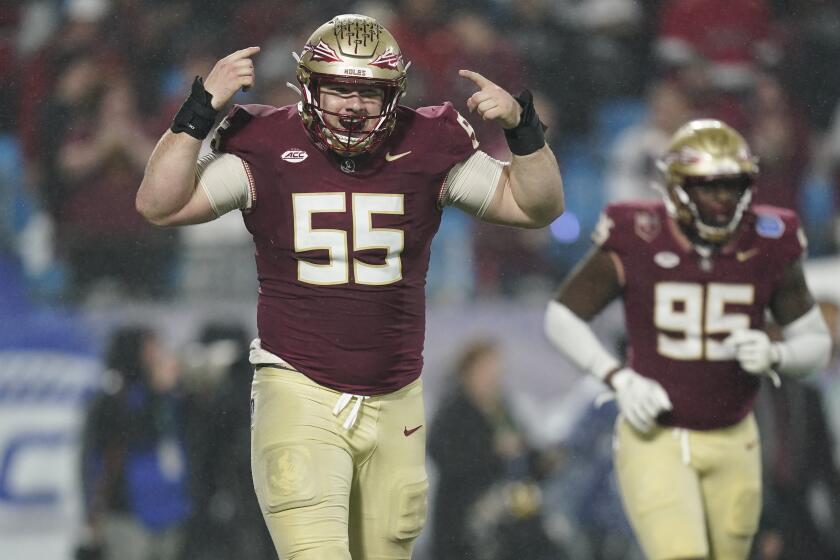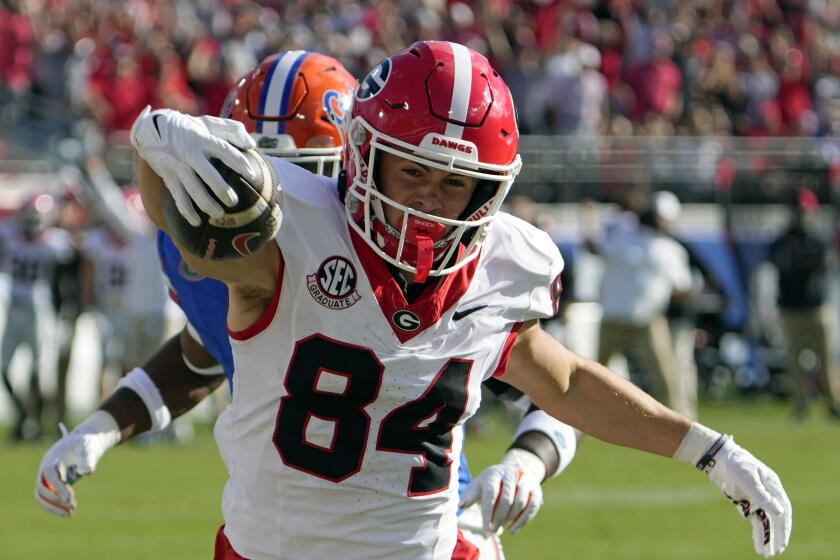McCourt’s Dodgers are bankrupt, and all you get is this T-shirt?
In calmer times, the true blue Dodgers fan might decide whether to buy a Matt Kemp T-shirt for his wardrobe or a Clayton Kershaw jersey.
In these turbulent times, the discerning Dodgers fan can decide whether to buy a shirt that supports a player or maligns the owner. As Frank McCourt has expanded his two-year legal battle to retain ownership of the team from divorce court to bankruptcy court, the opportunities for fans to share their discontent have expanded as well.
And, for a few entrepreneurs among those agitated fans, those frustrations have turned into business opportunities.
“We’re seeing so many people who feel the same way, with a shirt or poster or whatever,” said Jon Moore, a Los Angeles event promoter. “It’s kind of like a little movement.”
Moore unveiled the “Frankrupt” clothing line when McCourt’s Dodgers filed for bankruptcy in June, with this slogan: “Apparel for the fed-up LA baseball fan.” Moore said he had sold about 600 T-shirts, sweatshirts and caps online and 200 more in Tradition, a Westlake Village store.
The T-shirts run from $19.99 to $29.40. For every $19.99 T-shirt he sells, Moore says he makes about $8 if the sale is online, a few dollars less if in the store.
He won’t be buying the Dodgers with those profits, or even buying four season tickets within shouting distance of the owner’s box at Dodger Stadium.
“Making money is cool,” Moore said. “But it was out of total frustration. We need to do something, so I thought, ‘Let’s make a shirt to show how upset we are.’ ”
As social media expands its influence, the buzz surrounding a catchy idea dissipates quickly, and people move on to the next catchy idea, said USC professor Todd Boyd, who studies popular culture, including sports and fan behavior.
“The shelf life for making a quick buck on a negative T-shirt about Frank McCourt is probably quickly evaporating,” Boyd said.
For the moment, however, there are T-shirts aplenty, all just a click or two away. The Major League Baseball online shop refuses orders for a Dodgers jersey personalized with the name “Chapter” above the number 11, but various sites offer generic blue and white T-shirts with Chapter 11 on the back.
The online vendor Zazzle, which allows customers to submit and sell their own designs, offers a variety of T-shirts priced from $20.95 to $23.50, including one reading, “Go Dodgers, Go Away Frank” and another reading, “Who killed Dodgertown?”
The wewantcuban.com site — lobbying for Mark Cuban, owner of the NBA champion Dallas Mavericks, to buy the Dodgers— offers this deal: For every “We Want Cuban” T-shirt you buy (some for $15, others for $20), a postcard will be sent to McCourt urging him to “get the Frank out” and sell the team.
The selldodgers.com website pitches its message on T-shirts in English and Spanish, for $14.95 each, with one version aimed at McCourt and another at his ex-wife, Jamie.
Michael Greene, a movie and music producer from Topanga, runs the site and says he has sold 211 T-shirts. He also has given away 250, including 80 to radio and television personalities he hoped would promote the shirts.
In all, Greene said he had lost about $1,000.
“A small price to pay to try and create a groundswell,” Greene said, “which it didn’t.”
Greene said he wanted to call attention to the “shenanigans” of the McCourts’ alleged diversion of team revenue for personal use. He said he canceled the season tickets he has had with his sons since 1989.
“It absolutely broke our tradition,” Greene said. “We’re terribly empty inside, from not seeing our Dodgers. But, if McCourt sold the team on Wednesday, then Thursday night would be sold out.”
With the proliferation of Facebook and Twitter to promote websites and T-shirts, the opportunity for fans to share their feelings about their favorite team goes well beyond calling a radio talk show or holding up a sign at the ballpark.
“Or — before this year — flying Laker flags,” Boyd said. “Those are old-school ways of showing your allegiance.
“When you add the element of social media, you have ways of organizing. It goes from random acts of individuals into the context of a larger group.”
Attorneys for Major League Baseball alluded to fan sentiment in their opening brief in bankruptcy court, citing the protracted and often sensational McCourt divorce case.
“That divorce proceeding was the subject of intense media coverage,” the MLB filing read, “and spawned websites and blogs dedicated to the exposure of what their contributors considered the extraordinary personal and financial excesses of the McCourts at the expense of the club.”
That line struck a mildly uncomfortable tone with Josh Fisher, who runs the respected dodgerdivorce.com website. While other sites unabashedly bash McCourt and his ex-wife, Fisher provides sober legal analysis without the general outrage against either or both of the McCourts.
“I’ve tried my best to keep my site from becoming one for personal attacks, or a hack-and-slash kind of place,” Fisher said. “I think my site had the effect not of exposing some of their financial dealings, but of commenting on them.
“But I understand why they worded it that way, because people react that way to what they see.”
Fisher, 25, a Dodgers fan who grew up on the Palos Verdes Peninsula, started his website as a second-year law student at the University of Minnesota. He spent $10 to set up his site, he said, and he rejected advertising inquiries from some anti-McCourt vendors.
As the divorce proceedings lasted through his third and final year, he paid his own way to Los Angeles to cover the trial and provided commentary for several media outlets.
He will start work this month at Bryan Cave, a law firm with offices throughout the United States, Europe and Asia. As he applied to law firms, his transcript could speak for him, but so could his website writing and radio and television appearances.
“You walk in there and you’re a resume,” Fisher said. “A lot of what you can do to separate yourself is to have a little bit of a story.”
On Facebook and on Twitter, and on T-shirts and on websites, the McCourt saga can be yours for the telling . . . and the selling.
twitter.com/BillShaikin
More to Read
Get our high school sports newsletter
Prep Rally is devoted to the SoCal high school sports experience, bringing you scores, stories and a behind-the-scenes look at what makes prep sports so popular.
You may occasionally receive promotional content from the Los Angeles Times.







